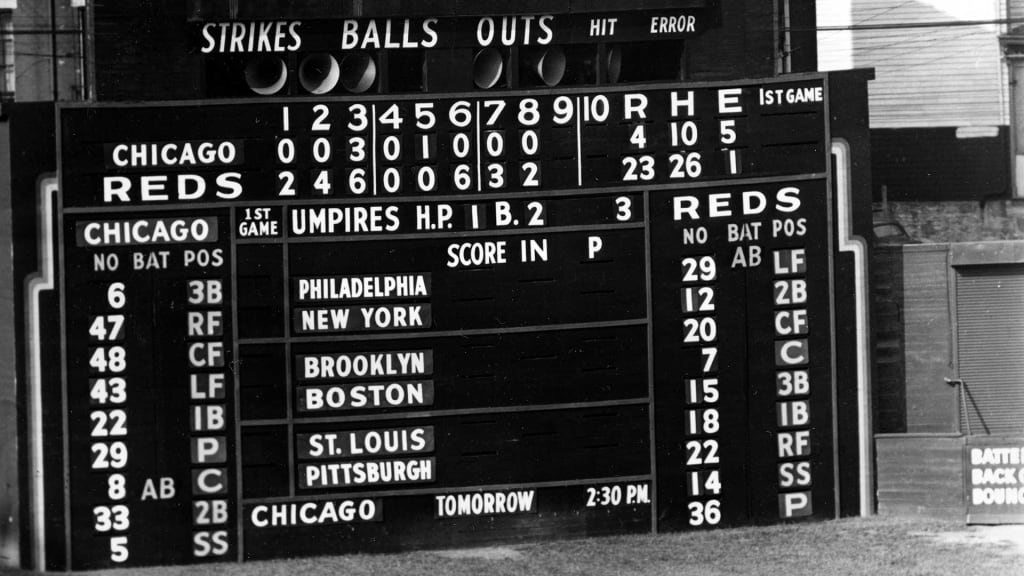CINCINNATI -- You don’t have to be an all-time great member of the Reds to have an all-time great game as a hitter for the Reds. One legendary game can provide a lifetime of memories, stories and free dinners and drinks on the speaking circuit.
Cincinnati has seen its share of great individual hitting performances in a single game. Here are five of the all-time best.
1. Scooter Gennett, June 6, 2017, vs. Cardinals
Still a utility player who was starting in left field before eventually becoming the regular second baseman, Gennett did something no Reds player had ever done. He became the 17th Major League player to hit four home runs in one game during a 13-1 rout of the Cardinals at Great American Ball Park. Gennett, who was 5-for-5 in the game overall, tied a franchise record with 10 RBIs and set a new one-game franchise record with 17 total bases.
A blooped two-out RBI single in the first inning started the record night and was followed by a grand slam in the third inning, a two-run homer in the fourth and a solo shot in the sixth. With a lot of anticipation in the eighth inning, Gennett delivered a two-run homer to right field. That made him the first big leaguer to have five hits, four home runs and 10 RBIs in a game. He had snapped an 0-for-19 skid the previous night.
2. Walker Cooper, July 6, 1949, vs. Cubs
Cooper spent parts of two seasons with the Reds as a catcher from 1949-50 but was the team record holder in total bases and RBIs before Gennett. Against the Cubs at Crosley Field, the 34-year-old was 6-for-7 with three homers, 10 RBIs, five runs scored and 15 total bases during a 23-4 victory. His six consecutive hits tied a league record at the time.
Only a few weeks earlier, on June 13, 1949, Cooper was traded from the Giants to the Reds for Ray Mueller. He slugged 16 of his 20 homers that season for Cincinnati after a slow start in New York. The Reds traded Cooper to the Boston Braves on May 10, 1950.

3. Joey Votto, May 13, 2012, vs. Nationals
Following a three-hour, 36-minute rain delay before first pitch on Mother’s Day and during a nearly four-hour game, Votto made it all worth the wait for soggy fans. He went 4-for-5 with three home runs -- including a walk-off grand slam for a dramatic come-from-behind 9-6 Cincinnati win over the Nationals at Great American Ball Park.
Votto hit a first-inning, opposite-field solo homer to left field, a solo homer to center field in the fourth and an eighth-inning double to the right-field wall. In the bottom of the ninth with the bases loaded, he ended the game with a drive to right-center field.
According to the Elias Sports Bureau, Votto became the first player in Major League Baseball history to hit three homers and have one of them be a walk-off grand slam in the same game.
4. Johnny Bench, July 26, 1970, vs. Cardinals
In the midst of Bench's first MVP season while leading the Reds to the National League pennant, manager Sparky Anderson gave him a quasi-break on a hot day while keeping his bat in the lineup. Instead of catching, Bench started in left field and went 4-for-5 with three homers -- all against fellow future Hall of Famer Steve Carlton -- with seven RBIs and 13 total bases during a 12-5 win over the Cardinals at recently opened Riverfront Stadium.
Bench hit a three-run homer to left field in the first inning, a two-run homer to left field in the second inning and led off the fifth with yet another homer to left. Bench led the league with 45 homers and 148 RBIs to win the first of his two career NL MVP awards.
5. Eric Davis, June 2, 1989, vs. Padres
Against the Padres at Riverfront Stadium during a 9-4 win, Davis became the first Reds player in 40 years to hit for the cycle. The center fielder was 4-for-4 with a double in the first inning, a single in the third inning, a home run in the fourth and achieved the cycle with an RBI triple in the seventh inning. He also had six RBIs in the game.
There have been four other Reds to hit for the cycle: Mike Mitchell (1911), Heinie Groh ('15), Harry Craft ('40), Frank Robinson ('59) and Elly De La Cruz (2023).
